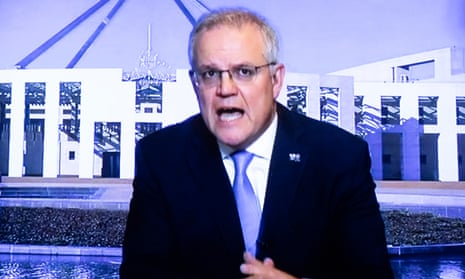Genuinely, this is a very difficult balance. In a pandemic, we need leaders and public health experts confident enough to change their minds when the facts change.
But while flexibility and dexterity is absolutely desirable, coherence is also important. Communication needs to be simple and clear. If people are to maintain confidence in the public health instructions formulated by experts and articulated by political leaders, Australians need to be assured that the high level deliberations shaping their lives are methodical rather than panicked.
Let’s consider the AstraZeneca vaccine as a case in point.
On 8 April Scott Morrison told Australians he had accepted expert advice that Pfizer be the preferred vaccine for under-50s and AstraZeneca the preferred Covid inoculation for Australians over 50. That announcement followed accumulating evidence that the AstraZeneca jab was associated with extremely rare but potentially deadly blood clots.
Not all the premiers were convinced about the merits of that decision. During a national cabinet discussion the next day, the Queensland premier, Annastacia Palaszczuk, raised a number of questions about whether the line should have been drawn at 60 years of age rather than 50, citing publicly available advice from the Therapeutic Goods Administration about blood clots found in other jurisdictions in women under 60.
Other state and territory leaders also asked questions. At one point during the discussion on 9 April, the New South Wales premier, Gladys Berejiklian, said communications around the decision needed to be clear in order to avoid supercharging vaccine hesitancy.
By the third week of June, the guidance changed.
More than 2 million people aged 50-59, people previously advised to take AstraZeneca vaccine, were told to take the Pfizer jab. That abrupt change in advice infuriated people who might have preferred Pfizer for their Covid inoculation, but had signed up to taking the AstraZeneca vaccine. It also fuelled hesitancy.
Now, the advice has changed again.
As of Monday night, Morrison says people under 40 can put their hands up for the AstraZeneca jabs, because the commonwealth will indemnify any GPs prepared to administer the vaccination (which might well be necessary, but will sound mildly terrifying to the cohort of Australians inclined to significantly over-state the risks).
Let’s be clear why the goalposts keep shifting.
Obviously the emergence of the Delta variant has upended the risk/reward calculations our leaders and experts are making on an hourly and daily basis.
But part of the reason the picture keeps changing is more basic than the arrival of a new, more infectious strain. Leaders have to keep revisiting their own AstraZeneca determinations because there aren’t yet enough doses of alternative vaccines to supplant the AstraZeneca jabs.
Why is that the case? There aren’t enough alternatives because the Morrison government lost the supply race in the middle of last year.
Now, the second winter of the pandemic is upon us, and Australia is facing its most dangerous moment in the coronavirus pandemic since the Victorian second wave. If there were sufficient quantities of alternatives readily available, leaders would not have to keep shifting the goalposts on AstraZeneca. They would just roll out the alternatives rather than bamboozle the public during dinner time press conferences.
That’s the truth of it.
But here we are.
Apart from phase 3 of the AstraZeneca guidance, there was another curiosity on Monday night. Probably because I’m not an epidemiologist, I don’t understand why vaccinations have not been mandatory for Australia’s aged care workforce right from the get-go given this workforce looks after the people most at risk of dying from Covid-19.
This reluctance to make vaccinations mandatory has always seemed strange. But Morrison has told the public repeatedly that decision was based on health advice. Apparently that advice has now changed and aged care workers will need to have at least one jab by September.
It really wasn’t clear last night, at least not to me, why the advice had changed, apart from an aside from Morrison that he’d pushed the point with the health advisers, and an acknowledgment from the chief medical officer that workers needed support for a day off to manage side-effects, and now they had it.
Morrison evidently senses fatigue and frustration building up in the community – a creeping sense that the exceptionalism of the first year has been squandered in the second by exhaustion or by complacency, who knows which.
Obviously fatigue and frustration, and growing community fractiousness, isn’t helpful for a prime minister who will face the people at an election some time in the next 12 months.
So on Monday night, Morrison encouraged Australians to cast their minds back to last year, to “continue to show the same determination that we have showed, particularly over that first year in the pandemic” – the year when his government was seen to be succeeding.
Morrison also sought to soothe.
It’s not me driving you nuts, he suggested implicitly to people watching the press conference at one point, it’s the pandemic making you cranky, wearing you down. “It’s the pandemic, that’s the reason why these things are happening, and happening not just in Australia but in all places around the world”.
Yes, it’s the pandemic. For sure. But Morrison can’t absolve himself of responsibility for the roads not taken.
The coronavirus didn’t stop Australia getting Pfizer, or failing to vaccinate workers, or failing to roll out dedicated quarantine facilities.
That’s on him.

